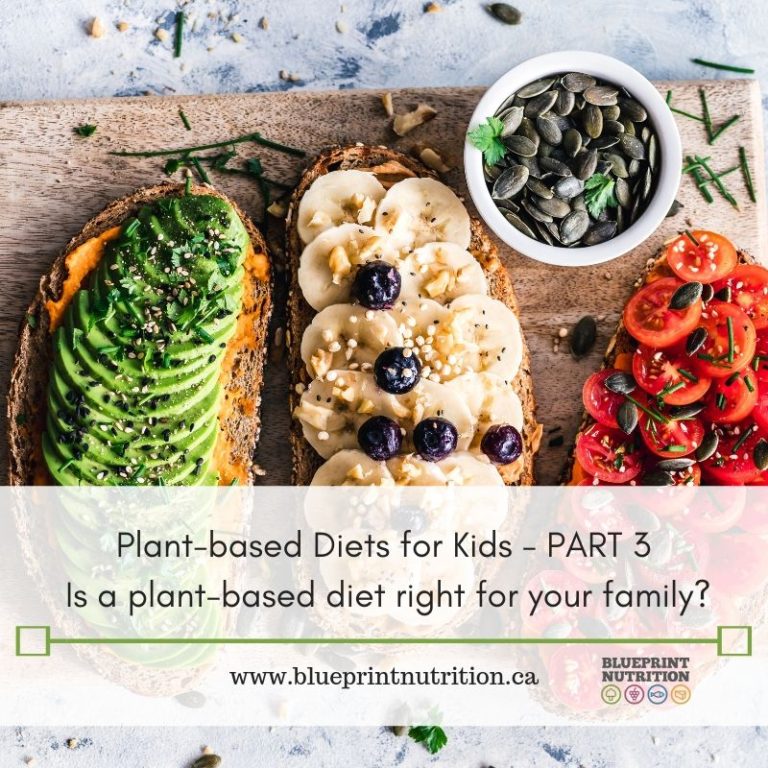In this 3-part series exploring plant-based diets for children, we’ve learned that vegetarian and vegan diets are safe for all life stages but that there are some key nutrients (especially for vegan diets during pregnancy and infancy) that we need to be mindful of including/supplementing in the diet. Today, in our last segment, we will explore some of the questions that you may want to consider when thinking about adopting a plant-based diet for your child or family.
For many parents who work with us, the decision for their child/children to adopt a plant-based diet is straight-forward as parents follow a vegetarian or vegan diet and want their kids to eat the same meals as they do. Typically, this starts when introducing solids and babe is unaware of any other dietary pattern so acceptance is high.
For other families, the decision to adopt a plant-based diet might come later, say when the child is 1, 2, 3 or 10 years old. If you find yourself here, it may be a bit trickier, especially if you haven’t already been eating a lot of plant-based proteins.
Regardless if you have older or younger kids, this blog contains some questions and thoughts that you might find helpful to work through as you navigate the decision to adopt a plant-based diet.

Plant-based Diet Knowledge
You don’t need to have a degree in rocket science to eat a healthy plant-based diet but you do need to have a solid understanding of the key nutrients of concern for children and how to improve absorption of nutrients from foods, while decreasing the naturally-present inhibitors.
Both the Canadian and American position papers on plant-based diets in children strongly recommend that families work with a registered dietitian throughout all life stages to ensure key nutrients for growth and development are being met. Whether you’re new to plant-based diets or an old pro, please consider booking a few appointments with a dietitian in your area who specializes in plant-based diets for children.
While there are copious amounts of books and websites on this topic, including “Doctor Google”, nothing replaces the counsel of a trained dietitian who specializes in paediatrics and can assist you with the questions and concerns that are relevant for you and your childs’ specific or unique concerns. You trust your teeth to a dentist, so trust your child’s growth and development to a dietitian!
Plant-based Diet Cost
Following a plant-based diet is not more expensive (in fact, it can be cheaper!) but for certain types of plant-based diets and life stages, you may need to regularly purchase supplements which can be pricey depending on what is required. For example, a liquid B12 supplement for infants can be upwards of $30 vs. traditional tabs for adults at $10. Some of these supplements are non-negotiables.
Include a discussion around your child’s supplement plan with your dietitian so that you have an idea of the monthly/yearly cost of these supplements and can budget accordingly. This is not an area that you can “skip” out on, especially for children following a vegan diet.
Consistency
On the note of supplements, when required, supplements must be given consistently to ensure deficiency does not occur. Developing a routine around this is important and should include who gives the supplement and at what time of day. Typically there is one parent in every family who wears the hat of “Minister of Health”. That’s the person that is typically in charge of ensuring supplements are given.
Consistently providing a diverse array of foods that contain the essential nutrients required for growth and health is important too. A well-planned plant-based diet ensures that, for example, calcium-rich foods are given daily – not just weekly or monthly. Knowledge must translate into consistent daily action.
Caretaker Cohesion
Members of a family might have different diets or patterns of eating – that’s understandable. However, we do believe it is important when it comes to children that they are given consistent messaging about food. It’s not helpful if one parent is following a plant-based diet and the other isn’t, for the latter parent to bad-mouth the “hippie food” and “sneak” in fried chicken on the weekend when their spouse or partner is gone. This causes confusion for children and can breed an unhealthy relationship with food and disordered eating down the road. We don’t want any of that!
If children are being raised at different homes during the week, it is preferable that there is a unified approach to what is being taught about food. This is true for all children – not just those on a plant-based diet.

What to say to Grinch Grandma
Your extended family may not all think that a plant-based diet is “healthy” and although well-meaning, grandma may turn into a grinch and give you a lecture on how children can’t get enough protein without meat. Sigh / cue eye-rolling…
Do you have a plan in place as to how to address this with grandma or any other family members or friends? You really want to avoid a full out battle at the supper table between yourself and your kids’ uncle who is on the carnivore diet while your 4-year-old’s highly sensitive ears are listening!
Keep in mind that there will never be one pattern of eating that all humans will ever agree on (in my opinion at least!) So, state your 2 cents on the topic, and be willing to listen to their opinion without harsh judgement. In the end, you will likely have to agree to disagree.
Deviations and Accommodations
Despite the growing number of Canadians who follow a plant-based diet, the majority still include meat in their diets. If your child attends a birthday party, sleepover, hockey tournament or even daycare where there are no vegan/vegetarian options, will you pack food or encourage your child to try a meal with animal products?
If your teen decides that he or she would like to eat meat while the rest of the family does not, are you able to accommodate?
There is no “correct” answer here – simply questions for you to think about.
With a little bit of planning and strong communication between your partner/spouse/friends/family (and dietitian too!), you can ensure that the transition to plant-based eating at your household is as slick as spreading avocado on toast!
And with that, we end our series on plant-based diets for kids.
What other questions do you have? Leave a comment below!
Take it one bite at a time,
Rosanne






